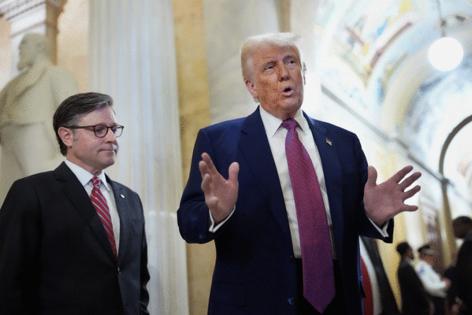Editorial: Hoping for a bond market crash to take down MAGA? Please wish for something else
Published in Op Eds
Americans unhappy with President Donald Trump’s second term have taken to wishing for something they shouldn’t.
If only the U.S. Treasury bond market were to crash, the thinking goes, then Trump would be forced to change his policies. Bond traders could simply knock down the whole economic house of cards and then, presto! Goodbye to tariffs and hello to fiscal responsibility.
Time for a reality check: First, a bond market crash would be a disaster that would cost Americans dearly for years to come. Second, the bond market sure doesn’t look like it’s going to crash.
How do we know? No one can predict the future, but for decades Chicago has played a leading role in the Treasury markets via CME Group futures contracts. And one great thing about futures is that anyone can see what real traders putting real money on the line believe is going to happen in, yes, the future.
The most active 30-year Treasury bond and 10-year Treasury note contracts show expected prices through the end of the year, and there’s been volatility, for sure. They also reflect an unusual pattern of interest rates staying relatively high even as the dollar weakens, probably because Trump’s trade wars do indeed stand to hurt the economy, as does the lamentable lack of fiscal discipline in Congress.
So far, however, the markets are not pricing in anything like a crash. In fact, long-term interest rates are less than 5% and inching lower in recent days, which is hardly a sign of an imminent crisis.
Of course, markets can turn on a dime, as the United Kingdom experienced three years ago. A newly elected prime minister, Liz Truss, pushed through an irresponsible budget that would have funded huge tax cuts with increased borrowing. Sound familiar?
In that case, the reaction was swift: Traders dumped British bonds and sent the British pound plunging against the dollar. Truss wound up being forced out after just 50 days in office, and the British economy is just now starting to recover.
The same could happen to the U.S., in theory. But in fact, the U.S. economy has a much greater capacity to absorb bad policy than did the U.K., because it has been doing quite well.
At a speech earlier this month, Austan Goolsbee, who heads the Federal Reserve Bank of Chicago, likened the economy to a buff gym rat with a six-pack of abdominal muscles. Trouble is, this gym rat has a layer of fat over the muscles, so they’re hard to see. In his analogy, the underlying economy is strong, but it’s being obscured by the uncertainty of Trump’s on-again, off-again tariffs, now popularized by the acronym TACO, among other destabilizing policies.
But with unemployment at just 4.2% and inflation at 2.3% (and closing in on the Fed’s 2% target) the “hard data” are still amazingly healthy. Not only did the U.S. avoid an oft-predicted recession over the past several years, but growth picked up momentum throughout 2024. The U.S. remains the world’s wealthiest country, and if it decided to curb its growing debt by raising more revenue, it could well afford it.
But the political will is missing, and “soft data” such as surveys of consumer sentiment and business investment plans are decidedly negative. At the same time, some notable experts are warning of trouble ahead if the U.S. maintains an unsustainable course.
Hedge fund kingpin Ray Dalio recently told Bloomberg he gives the U.S. “three years, give or take a year,” to avoid an economic “heart attack.” Jamie Dimon, head of JPMorgan Chase, similarly predicted the U.S. is headed for “a crack in the bond market,” adding, “I just don’t know if it’s going to be a crisis in six months or six years.”
Treasury Secretary Scott Bessent reacted to Dimon’s prediction by noting that Dimon loves to make predictions and, according to Bessent, “None of them have come true.”
What is true is that given the strength of the economy, interest rates should be lower. In continuing to issue a massive amount of debt, America is beginning to pay what British pundits during the Truss fiasco took to calling the “moron risk premium.” That’s the extra cost a country pays in the form of higher interest rates on its debt when incompetent leadership raises the risk of financial instability or default.
In his recent talk, Goolsbee acknowledged that U.S. interest rates are higher than they should be because of policy uncertainty. Getting that “dust out of the air,” as he put it, would tee up lower rates. “If you have stable, full employment and inflation going to target, rates can come down.”
Lower rates make it cheaper to obtain loans and manage debt, which would encourage consumer spending and business investment. Washington needs to cut the chaotic policymaking and embrace responsible political solutions without bond vigilantes forcing the issue — as much as Trump’s critics wish they would.
_____
©2025 Chicago Tribune. Visit at chicagotribune.com. Distributed by Tribune Content Agency, LLC.

























































Comments